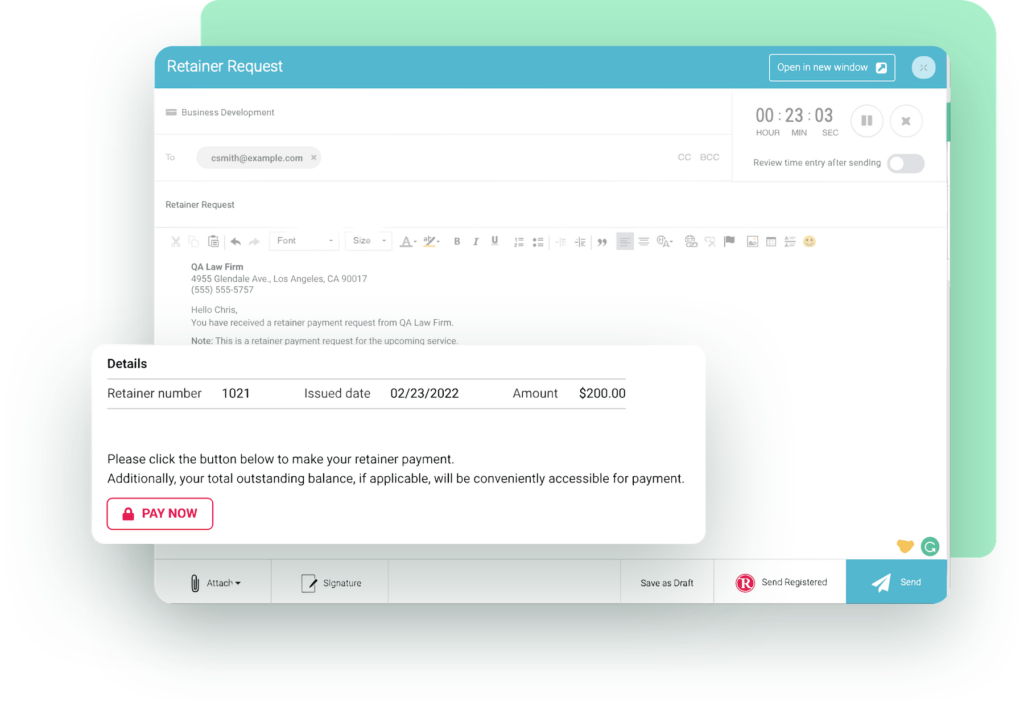While a general retainer agreement can be a great source of steady, predictable income, it’s crucial for law firms to consider the potential challenges and risks.
Deciding on the right pricing strategy, such as opting for a general retainer agreement with a client can be complex due to several variables, like the scope of the legal work involved, the duration of the engagement, the firm’s workload capacity, the level of expertise required, and the prevailing market rates for similar services.
Understanding General Retainer Agreements
A general retainer agreement, an upfront contract between a law firm and a client, guarantees the lawyer’s services for a certain period. This agreement not only ensures the client’s access to legal expertise but also provides a steady income stream for the firm. However, it comes with its challenges such as financial risks, time commitments, potential conflicts of interest, workload unpredictability, client expectation management, and potential billing disputes. Therefore, it’s crucial to evaluate whether retainer pricing is the most suitable strategy for each specific client.

Retainer payments in CARET Legal
When It Makes Sense: The Green Lights
The following “green light” situations illustrate when a general retainer agreement could be the most beneficial choice for both the law firm and the client. We also illustrate what legal practice management software (LPMS) can contribute to the process.
Ongoing Legal Services
Example: A corporation requiring ongoing legal services for contract reviews, compliance issues, and potential litigation would find a general retainer agreement beneficial. With an LPMS, law firms can efficiently manage these ongoing tasks, ensuring nothing falls through the cracks.
Steady Income Stream
Example: A law firm specializing in family law might find a general retainer agreement with a client going through a prolonged divorce process lucrative. A legal practice management system can assist in tracking billable hours and generating invoices, ensuring a steady and well-documented income stream.
Long-Term Client Relationship
Example: A law firm representing a startup could benefit from a general retainer agreement as startups often face a variety of legal issues as they grow such as intellectual property rights disputes, compliance with data protection regulations, and drafting of employment contracts. An LPMS can manage all aspects of this relationship, making it easier to foster a long-term relationship.
Being aware of when a general retainer agreement might not be the ideal choice can help to circumvent potential challenges, ensuring a more efficient and smoother legal process.
When It Doesn’t: The Red Flags
Even though a general retainer agreement seems commonplace, there are instances where it might not be the most suitable solution. It’s crucial to identify these “red flag” scenarios to make the most informed and beneficial decision for both the law firm and its clients. Being aware of when a general retainer agreement might not be the ideal choice can help to circumvent potential challenges, ensuring a more efficient and smoother legal process. Let’s examine some of these “red flag” scenarios where a general retainer agreement might not serve as the best choice:
Unpredictable Scope of Work
Example: A law firm specializing in criminal law may be approached by a client seeking representation in a complex corporate litigation case. By having real-time visibility into your firm’s health, it becomes possible to assess resources and capabilities, providing a clear picture of whether it’s feasible to handle the case.
Unrealistic Client Expectations
Example: A client may expect a law firm to be available 24/7 under a general retainer agreement. A LPMS can help manage these expectations by providing clear communication channels and transparency about the firm’s availability and capabilities.
Billing Disputes
Example: If a client has a history of disputing bills or late payments, a general retainer agreement might not be the best choice. An LPMS can help by providing transparent and accurate billing information, reducing the likelihood of disputes and maintaining a positive client relationship.
Make the Right Choice
While a general retainer agreement can be a great source of steady, predictable income, it’s crucial for law firms to consider the potential challenges and risks. Legal practice management software can play a vital role in this decision-making process, providing valuable insights, simplifying operations, and improving client relationships.
So, why wait? Experience first-hand how CARET Legal can support your firm in making informed decisions about general retainer agreements. Start your free trial, or schedule a demo to talk with us in detail on what challenges you’re looking to solve.